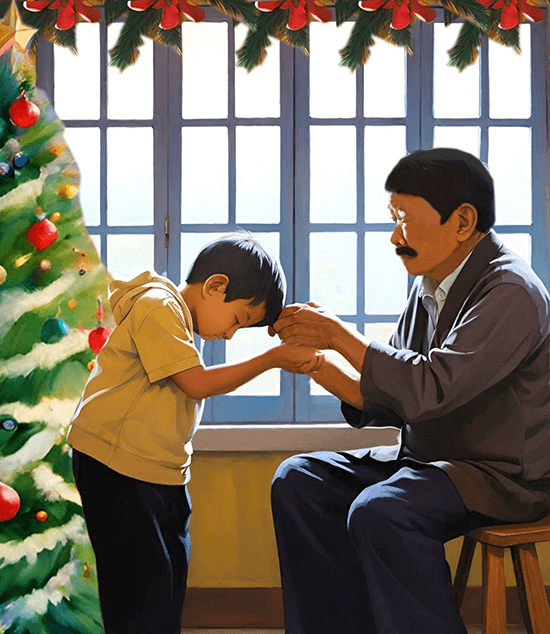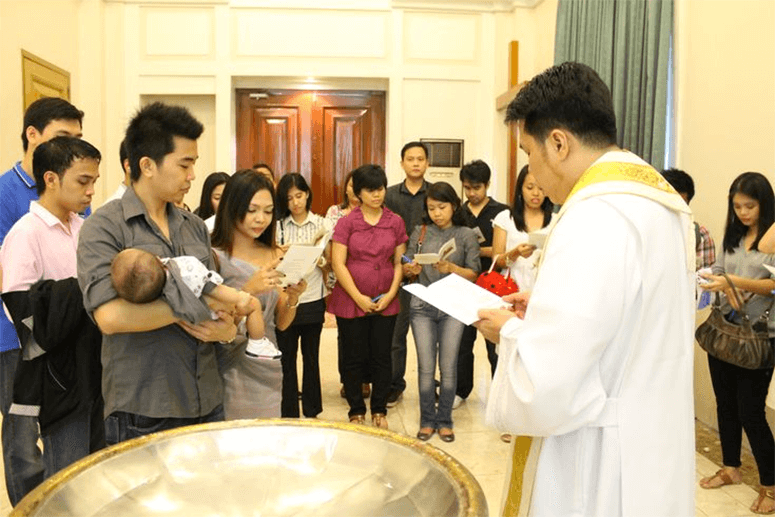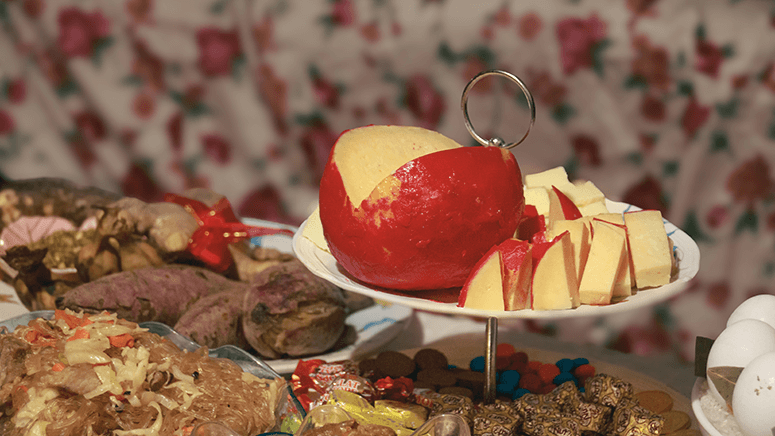Mano po, Ninong, mano po, Ninang
Christmas is in the air. It has been that way since September, and some would say even earlier. Some of my neighbors don’t bother to remove their twinkling parols and lights hanging from real trees. They’re in season now again, after all.
Jose Mari Chan has been battling Mariah Carey for dominance of mall music, while godparents are gearing up for the attack of the godchildren. As a Gen Xer with a modest roster of inaanak, majority of them nephews or nieces, I feel I’m slightly qualified to spill the tea on this delightful (and occasionally exasperating) cultural phenomenon.
It starts with the ritual. It’s a religious rite, first and foremost.

So, you’ve just been asked to be a ninong or ninang. Congratulations! Whether at a baptism or a wedding, you’ve officially been anointed as a VIP in someone’s life—part mentor, part sponsor, and (let’s not sugarcoat it) part ATM.
As someone who’s been in your shoes, a penny-pinching one at that, let me tell you: This is no small feat. Between the spiritual duties and the constant tug-of-war with your wallet, it’s a gig that tests your patience, generosity, and creativity.
It begins with a simple, seemingly innocuous request: “Can you be my child’s godparent?” Images of The Godfather immediately come to mind—the romanticized mafia relationship that creates social and business links for life.
Cast showbiz aside and you might think this is about guiding a young soul in his spiritual journey. And it is, at least on paper and during the pre-ceremony orientation. But in the Philippines, baptisms may sometimes be less about divine grace and more about assembling a financial Avengers team for your child.

If you’ve attended a baptism recently, you’ll know that some sneaky parents rarely stop at one or two godparents, even if the birth certificate often only provides spaces for two. Why settle for a pair when you can have a full house?
Suddenly, aunts and uncles are standing shoulder-to-shoulder with instant BFFs from high school, from work, and from abroad. The unspoken reality? More ninongs equals more cash-filled envelopes for future birthdays, Christmases, and even a college fund.
Based on my experience as an unpopular ninong, my advice to a newbie is to start small. Give a thoughtful but modest gift, because once you’re in, you’re in for life. However, I maintain the conviction that a ninong is a second parent, and financial astuteness is a good start to this surrogate parenthood.
Not that I’m bitter, but I’ve seen the “proxy godparent” maneuver pulled off more times than I can count—where you’re mysteriously listed as a ninong even though you weren’t even at the church. Surprise! You now have an inaanak. My instant reply: Surprise! You don’t know where I work or live.
Baptisms, though, are the minor leagues compared to weddings. When you’re tapped as a wedding ninong, it’s a sign you’ve “made it”—or at least, you’re perceived to have made it. Here, the stakes are higher. No one expects you to merely show up; they expect you to show up with style, preferably with a thick envelope.

Weddings in the Philippines are more than a religious rite; they’re practically an industry. With eight to 12 pairs of sponsors, composed of oldies the bride and groom hardly recognize except from the fond stories of their parents, or from news sources if they’re politicians, it’s no wonder the wedding procession alone takes forever. Some families seem to treat weddings as Kickstarter campaigns, signing up wealthy relatives, old schoolmates, and that friend-of-a-friend who’s a CEO of a Fortune 500 company or a budding politician.
Modern wedding invitations don’t even beat around the bush. Many now include a list of cash-transfer options because apparently, the happy couple would rather skip the rice cookers, air fryers, and cutlery sets. And I thought those bridal registries back in the day were totally gauche. The modern system is efficient, of course, as efficient as ordering in each and every night, but it also raises the question: “Am I a beloved mentor, or just another line item on their budget spreadsheet?”
Here’s a tip for anyone who cares to listen: Contribute what feels right, but don’t go broke proving your worth. One of the main things you can impart as a ninong is the value of prioritization, and that memento vivere (remember to live) is more important than carpe diem (seize the day).

Now, if baptisms are the gateway, and weddings are the VIP section, Christmas is the battleground. Every December, your inaanak (or their parents) emerge from the woodwork like bullfrogs after the rain, armed with charm, nostalgia, and subtle guilt.
Back in the day, a resourceful ninong could hide behind a locked door and a well-timed “out of town” excuse (which I never did, primarily because they didn’t know where I lived). But thanks to modern tech, the hiding game has evolved. With apps like GCash and PayMaya, the season of giving is as inevitable as e-greetings accompanied by adorable but guilt-inducing as emojis and QR codes.
Do inaanaks ever outgrow this penchant for mendicancy? The answer, sadly, is no. If you think that the inaanak pipeline ever dries up, you’re naively mistaken. Even those old enough to have kids of their own will still find a way to angle for aguinaldo.

Sometimes, it’s nostalgia: “Ninong, remember when you used to give me gifts as a kid?” Other times, it’s sheer audacity: “Ninong, I have three kids now. Sending you their latest pics. So cute, right? You may send their pamasko along with mine.”
At this point, you have two options: Cave in with a smile or establish boundaries. Either is fine, as long as it doesn’t compromise the spirit of the season or make you lose a friend or kin.
Yes, we love to joke about the ninong/inaanak dynamics, but beneath the humor lies a deep-rooted tradition of generosity and connection. Christmas, for all its commercial quirks, is ultimately about family, community, and charity. As a ninong or ninang, you’re not just a gift-giver; you’re a role model and an honorary family member.
So, to the younger generation preparing for their first ninong gig, embrace the chaos with a sense of humor and heart. And to oldies but goldies, remember that it’s not about the gifts or the cash transfers but about the joy of seeing those inaanak grow into the next gen ninongs and ninangs.


